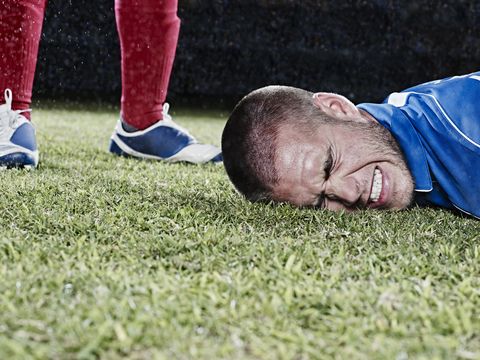
What do dizziness, headaches, jaw pain, and erectile dysfunction all have in common? These might sound like symptoms you experience after a wild night out, but they are actually all symptoms you probably didn’t know could be treated with physical therapy.
One common misconception is that physical therapists treat only musculoskeletal pain—or, in layman’s terms, you’ll only see them when you have an issue with injuries or pain in your bones, muscles, or joints. While that is a huge component of what we do, it is also only one portion of our treatments.
More and more Doctors of Physical Therapy (DPTs) are specializing in treating other systems, including the vestibular (inner ear) system and the male genitourinary system (this includes the male pelvic floor muscles and conditions such as erectile dysfunction). If you are in pain, it is always recommended to see an MD to rule out other problems before beginning physical therapy. But you should know that multiple treatment options probably exist for whatever it is that’s ailing you.
Here are 5 symptoms that you probably didn’t know could be treated by a physical therapist.
Dizziness or Vertigo

Getty Imagesklebercordeiro
There are many potential causes of dizziness, but one possible culprit is a problem with your vestibular system. Don’t know what that is? Dr. Klaus Dobra, PT, DPT, CSCS, a Doctor of Physical Therapy who specializes in treating vestibular disorders explains: “The vestibular system is the system responsible for the body’s awareness of directionality and movement through space.”
One of the most common conditions Dr. Dobra treats is Benign Paroxysmal Positional Vertigo (BPPV). Symptoms of BPPV include the sensation that the room is spinning. It can feel worse when you turn your head a certain way or lie down.
The condition is caused by calcium crystals called otoconia that rest in the labyrinth of the inner ear and give feedback to the brain about your position in space. When mechanically dislodged, by a sudden forceful head movement for example, the system providing positional information to your brain is disrupted. Thankfully, a quick assessment and an even quicker treatment to reposition the otoconia can often solve the problem. Dr. Dobra adds that people who have experienced this type of vertigo for years can often be fixed with one treatment.
Jaw Pain

Getty ImagesМихаил Руденко
Have you been told you have TMJ disorder or that you clench your jaw when you sleep? Stress and built up tension can contribute to habitual jaw clenching and tightness in the muscles surrounding the jaw and neck. This muscle tightness can even lead to headaches (more on that later).
While dentists have multiple treatments for TMJ pain, those who refer a patient to physical therapy (PT) are still few and far between. While PT may not change the alignment of your bite overnight, soft tissue work to the masseter, sternocleidomastoid, and lateral and medial pterygoid muscles (muscles around the TMJ), among others, can alleviate soft tissue restrictions and pain and potentially improve mobility as part of your treatment.
Concussions

Getty ImagesChris Ryan
Whether you are an ex-college athlete or just a weekend warrior, experiencing a concussion can be a debilitating and frustrating experience.
According to Dr. Alex Gometz, DPT, CIC, a triathlete and Doctor of Physical Therapy specialized in neurology, symptoms of a concussion can include: headache or “pressure” in the head, nausea or vomiting, dizziness, balance problems, blurry vision, light or noise sensitivity, feeling sluggish or groggy, confusion, memory or concentration problems, or simply not feeling “right.” Often, an injury that causes a concussion can disrupt the vestibular system, or affect the cervical spine, which can be treated with manual therapy, joint mobilization, stretching and strengthening.
“Managing a concussion is delicate and should be taken seriously and treated immediately,” says Gometz. He warns that, if not addressed, the injury can lead to long-term cognitive problems, chronic pain, and/or visual problems. A specially trained physical therapist can perform different tests to assess which system has been affected (neurological, vestibular, neurocognitive, or proprioceptive) and treat the appropriate system accordingly.
Pain With Urination or Sex

Getty Imagesvchal
While the term “pelvic floor physical therapy” has somehow become synonymous with “women’s health,” this is not the case at all. Both men and women have pelvic floor muscles and both men and women can experience symptoms associated with dysfunction.
For men experiencing anything from pain with sex, painful urination, difficulty going to the bathroom, dribbling, or even erectile dysfunction, a pelvic floor specialized physical therapy may be the practitioner they need.
“Pelvic Floor PT works just like going to PT for an ankle injury,” says Dr. Francesca Warner, PT, DPT, CSCS, a Doctor of Physical Therapy who specializes in treating male and female pelvic floor dysfunction. “Your PT will work with you to release the muscles that need lengthening or exercise the muscles that need strengthening.”
Headaches

Getty Imagesmichelangeloop
One of the most common types of headaches—tension headaches—are often caused soft tissue restrictions and tension in the muscles surrounded the face and neck.
A physical therapist can do a full assessment of your cervical (neck) range of motion, strength and soft tissue restrictions as well as looking at your posture and body mechanics to determine the proper course of care. More likely than not, you’ll have some muscles that need releasing, some weakness contributing to postural deficits and some strengthening to do. A DPT will determine the course of care that addresses your unique impairments to help reduce frequency and intensity of headaches and hopefully eliminate them completely.
Source: Read Full Article
